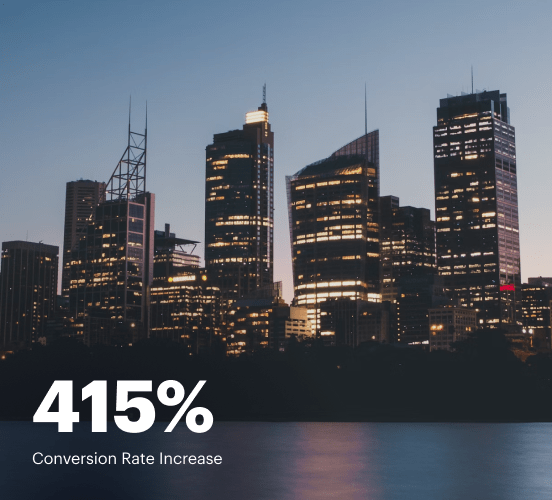Duda vs. Canva: the best platform for a seamless web experience
Discover how Duda compares to Canva regarding features and usability. Find out which platform provides the competitive advantage your business deserves.
Get startedSee how Instapage stacks up against the competition
| Feature | Instapage | Other builders |
| Drag-and-Drop Tools | ||
| Conversion-optimized templates | ||
| Manual and AI-powered A/B Tests | ||
| AI content suggestions | ||
| Popups and sticky bars | ||
| Canvas and grid blocks | ||
| Reusable and global elements | ||
| Form and popup builders | ||
| Built-in Heatmaps | ||
| Central analytics dashboard | ||
| Ad-to-page personalization and collections | ||
| Contacts, lists, and email | ||
| Dedicated, full-service CRO experts | ||
| Enterprise-ready platform |
Leading the way in building high-performing landing pages





Why Instapage is the smarter choice for your campaigns
Get everything you need to build, scale, and optimize high-converting landing pages—without coding.
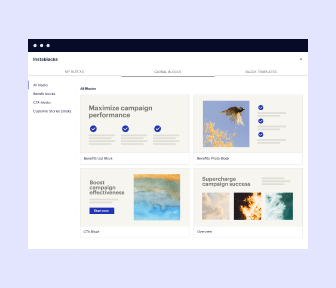
Easier page building without coding
Instapage offers a flexible and seamless page creation experience with a library of 500+ conversion-focused layouts, Instablocks®, a drag-and-drop builder, and AI content generation. With technologies like Thor Render Engine®, you can create on-brand, mobile-responsive landing pages that load quickly and start converting during initial visitor clicks.
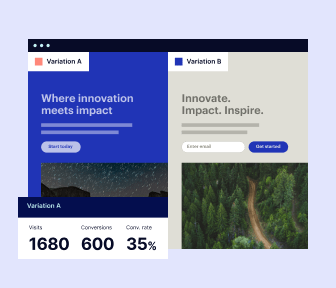
More insights — better results
Instapage lets you see in detail how each landing page experience and variation is performing so you can make targeted changes that boost page conversions. Use heatmaps for a better understanding of on-page activities, run A/B tests and AI-assisted experiments, and then track and evaluate results within robust analytics dashboards.
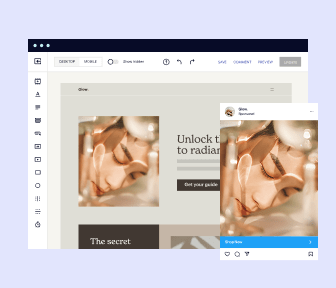
More personalized experiences
Instapage lets you quickly create high-performing landing pages tailored to each of your ad campaigns. Deliver personalized experiences for distinct audiences using dynamic text replacement. Effortlessly align specific advertisements to unique pages with AdMaps. Monitor audience-level metrics using our advanced data tools.
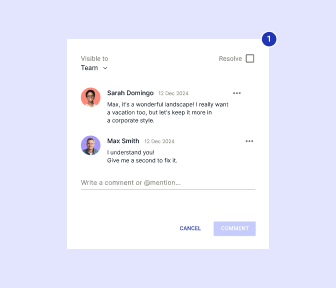
Built-in collaboration
Instapage collaboration capabilities bring your entire team together to speed up the process of landing page review, approval, and launch. No more frustrating and unnecessary revisions or edits scattered across emails. Provide instant feedback, conduct real-time page edits, and securely share your pages with outside stakeholders.
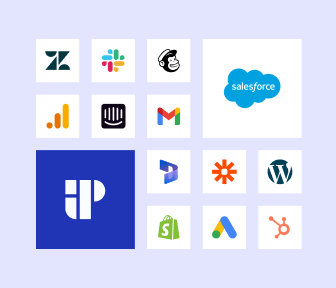
Free up time for your business
Invest time into business growth, not busy work. Launch landing pages faster with reusable forms and templates. Build once, reuse forever.
Explore all integrations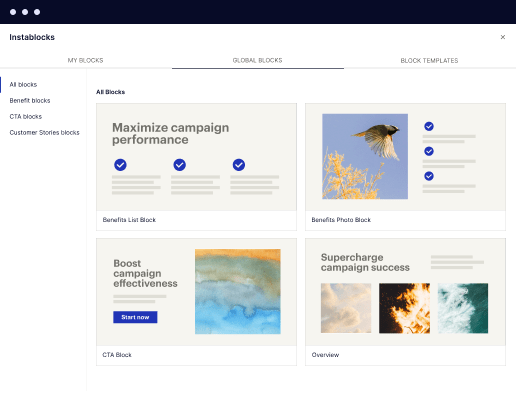
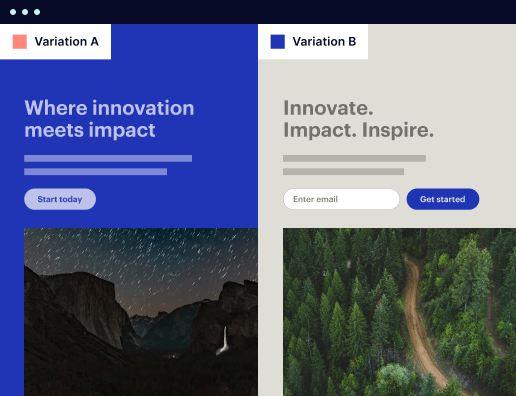
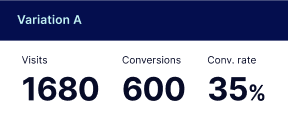
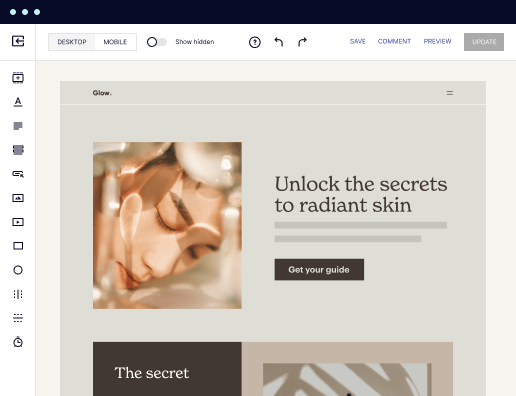

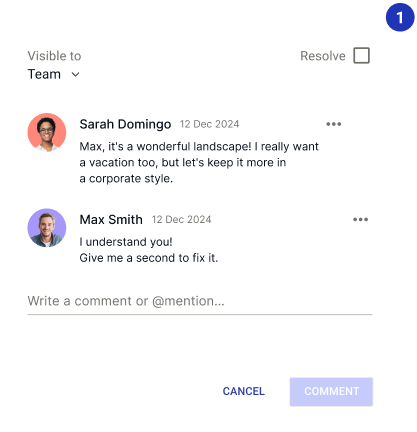
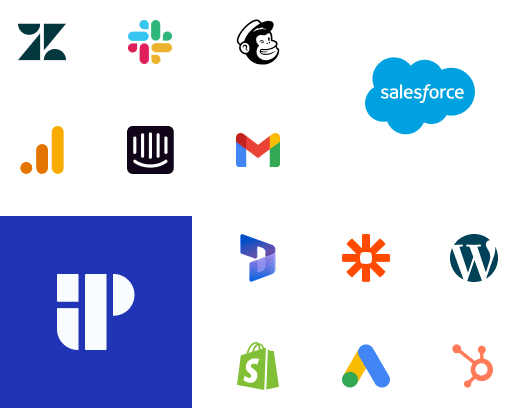
Easier page building without coding
Instapage offers a flexible and seamless page creation experience with a library of 500+ conversion-focused layouts, Instablocks®, a drag-and-drop builder, and AI content generation. With technologies like Thor Render Engine®, you can create on-brand, mobile-responsive landing pages that load quickly and start converting during initial visitor clicks.
More insights — better results
Instapage lets you see in detail how each landing page experience and variation is performing so you can make targeted changes that boost page conversions. Use heatmaps for a better understanding of on-page activities, run A/B tests and AI-assisted experiments, and then track and evaluate results within robust analytics dashboards.
More personalized experiences
Instapage lets you quickly create high-performing landing pages tailored to each of your ad campaigns. Deliver personalized experiences for distinct audiences using dynamic text replacement. Effortlessly align specific advertisements to unique pages with AdMaps. Monitor audience-level metrics using our advanced data tools.
Built-in collaboration
Instapage collaboration capabilities bring your entire team together to speed up the process of landing page review, approval, and launch. No more frustrating and unnecessary revisions or edits scattered across emails. Provide instant feedback, conduct real-time page edits, and securely share your pages with outside stakeholders.
Free up time for your business
Invest time into business growth, not busy work. Launch landing pages faster with reusable forms and templates. Build once, reuse forever.
Explore all integrationsGet started with Instapage in a few steps
-
Create your Instapage account
Start with Instapage by signing up via Google or your email. You'll get access to a free 14-day trial to discover Instapage capabilities. Feel free to cancel anytime during the 14-day trial if you decide that our product is not suitable for your business. -
Build and personalize your page
Create your first landing page from scratch or choose a template from 500+ customizable layouts. Use the drag-and-drop builder to add page elements, fonts, and backgrounds, refine content with AI, or add custom HTML, Javascript, and CSS. -
Review and make edits
Collaborate on page designs and streamline review processes. Invite your team members and stakeholders to review, edit, and provide feedback on your landing page. Collaborate knowing your page is confidential and only accessible to authorized users. -
Publish and track page performance
Publish your page to a domain or custom URL. Connect your pages to the ads you've created and track page performance within the analytics dashboard, run A/B tests and AI experiments, analyze results, and continuously optimize your landing page to maintain high conversions.
Duda vs. Canva: A Thrilling Comparison with a Surprising Contender
In the vast ocean of online marketing tools, choosing the right landing page builder can feel like finding a needle in a haystack. With platforms like Duda and Canva, marketers are presented with formidable options that promise to streamline their efforts in the digital landscape. Both tools boast unique capabilities and can cater to a variety of needs, but they aren’t the only players in the ring. Instapage lurks in the background, ready to disrupt the scenario with its own compelling offerings. So, how do Duda and Canva stack up against each other, and what sets Instapage apart in this bustling marketplace? Join us as we navigate through the features, usability, and value of these three contenders, helping you make an informed decision that best aligns with your marketing aspirations. (min:200 words, add the small paragraphs in this paragraph.)
Introducing the Titans
When it comes to landing page builders, Duda and Canva stand tall, revered by their users for different reasons. Duda showcases its prowess with a solid focus on responsive websites and a well-defined user experience, ensuring that marketers can create visually stunning landing pages that look great on any device. Its customization options cater to both beginners and experts, making it a go-to choice for various audiences. On the other hand, Canva charms with its intuitive design interface that makes graphic design a breeze, offering users a wide array of templates and elements to craft visually appealing pages. Canva grabbed the market's attention by allowing visual creators to easily build brand consistent visual assets, setting a benchmark for simplicity and creativity. As we gear up for an intense feature face-off, it’s essential to establish the competitors' strengths and how they plan to clinch the title of the preferred landing page builder. (min:200 words, add the small paragraphs in this paragraph.)
Feature Face-Off: A Closer Look
Both Duda and Canva claim their spot in the spotlight with a plethora of features designed to make landing page creation efficient and impactful. Duda flexes its muscles with a robust set of tools aimed at building responsive websites as well as landing pages. Meanwhile, Canva delights users with its extensive library of design elements and templates. But as both platforms pack a punch, let’s not forget that there's a competitor warming up backstage – Instapage, known for its advanced capabilities in conversion-focused landing page solutions. This adds an exciting twist to the comparison and hints at heightened competition. (min:200 words)
Usability: A Battle for User-Friendliness
Navigating through websites and creating landing pages shouldn't require a degree in rocket science. Duda and Canva both strive to cater to their users effectively, making usability a significant selling point. For newbies just stepping into the marketing ring, Duda provides an intuitive interface that simplifies the web design process. It offers structured workflows that guide users from start to finish. For seasoned marketers, however, the platform allows greater freedom to tinker and customize. Canva, on the flip side, focuses on straightforward design with drag-and-drop capabilities, making the creative process accessible to everyone. Learning the ropes on both platforms can feel more like a fun adventure rather than a steep learning curve; users are encouraged to experiment freely while crafting their perfect landing page. (min:200 words)
Duda's Powerhouse Features:
- Automatic responsive design for optimal viewing on any device
- Extensive customization options and advanced website editing tools
- Built-in SEO tools to enhance search engine visibility
- Dynamic content capabilities for personalized user experiences
- Analytics and reporting features designed to track user engagement
Canva's Creative Features:
- User-friendly drag-and-drop interface, perfect for all skill levels
- Rich library of templates and graphics for stunning visuals
- Collaboration features allowing team design access
- Options for animation and interactive elements in designs
Shared Strengths of Both Platforms:
- Intuitive user interfaces aimed at enhancing the design process
- Robust template libraries supporting diverse needs
- Integration capabilities with other marketing tools
- Responsive design elements enabling cross-device functionality
- User support through tutorials and community forums
- Regular updates with additional features to keep content fresh
As thrilling as this contest is, it’s hard not to notice that Instapage looms as a formidable competitor. While Duda and Canva display strengths in their own arenas, Instapage brings to the table a wealth of specific functionalities focused on maximizing conversion rates. It effectively combines user-friendly design with critical marketing analytics, making it an intriguing alternative for those who prioritize results. With Instapage around, we can bet that both platforms will feel the heat as they vie for top honors.
Performance: The Speed Showdown
In the online realm, performance matters. Website loading times and mobile responsiveness can make or break user experience, and both Duda and Canva are well aware of this fact. Duda generally delivers fast loading pages, optimized to ensure that content appears quickly, just like a well-trained fighter landing swift punches. On the other hand, Canva offers quick export options, enabling users to launch created designs almost immediately without sacrificing quality. However, slow-loading pages, much like molasses in winter, can lead to potential bounce rates that nobody wants to face. It’s essential to examine the platforms' capabilities in maintaining speed while delivering a quality user experience – because in the digital arena, time is of the essence! (min:200 words)
Support and Resources: The Unsung Heroes
Every champion needs a support squad, and this is no different for landing page builders. Duda and Canva both offer various support channels that users can tap into. Think of them as trusty sidekicks in times of need. Duda provides customer support through live chat, email assistance, and a dedicated help center, ensuring users can troubleshoot efficiently. Canva offers a supportive design community, along with help articles and video tutorials designed to guide users. Community forums are also thriving with experienced users willing to lend a hand to newcomers. This vast array of resources strengthens user satisfaction and confidence for both platforms.
Understanding the Pricing Landscape
Duda's Pricing Strategy: Key Benefits:
- Transparent pricing with no hidden fees
- Tiered pricing strategies accommodating different business sizes
- Value-added features included even at lower tiers
- No long-term commitments with flexible monthly payment options
Canva's Pricing Approach: Key Advantages:
- Free version with access to essential tools and templates
- Affordable plans that cater to individual and business needs
- Pro plan offers advanced features at competitive rates
- Access to premium content for a small fee, enhancing value
When considering pricing strategies, both Duda and Canva have their unique strengths. Duda's approach of offering flexible monthly plans ensures that users aren't locked into long-term commitments, while Canva entices customers with its free tier, making it accessible for budget-conscious creatives. However, when it comes to value for money, Instapage shines bright with its modular pricing that directly ties features to promotional outcomes. Flexible pricing options make Instapage a viable choice, especially for those focused on conversion rates and maximizing ROI.
It's crucial to have a clear picture of what you’re investing in. Duda and Canva both display transparency in their pricing plans, making it easier for users to see what they’re getting. Still, potential users may find themselves pleasantly surprised with the capabilities on offer, especially when exploring Instapage's tiered pricing that aligns with performance needs. Here, it’s all about getting what you pay for – at times revealing benefits in unexpected packages.
The Game-Changer: Introducing Instapage
In this exhilarating comparison, Instapage surfaces as the seasoned mentor, one that’s been observing from the sidelines, waiting for a moment to demonstrate its unmatched potential. With robust features tailored for high-conversion campaigns, it presents a different caliber of service that focuses heavily on results. Highlighting Instapage’s unique offerings, such as its extensive A/B testing capabilities, seamless integration with other marketing tools, and high-level customization options, it’s evident that it just might hold the key to unlocking your marketing success. Sometimes, the ultimate weapon in one's marketing arsenal is not just about competition but finding the right fit that aligns with one’s specific objectives. (min:200 words, add the small paragraphs in this paragraph.)
It’s essential to emphasize the importance of making well-informed choices tailored to both personal and business goals. Selecting the right platform can significantly impact your success in the marketing landscape. As we draw our comparison to a close, let’s encourage readers to explore the offerings of Instapage further, positioning it not just as an option, but as a powerful ally in their marketing journey – ready to propel them forward into new heights of success.



